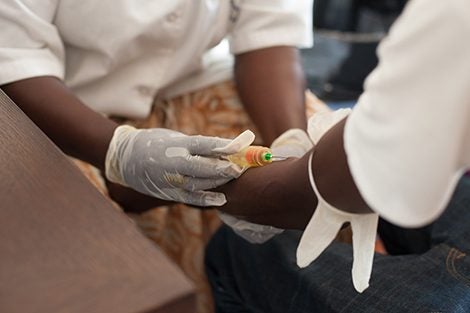For immediate release: February 5, 2018
Boston, MA – Vaccines have enormous impact not just on health, but on keeping people out of poverty, according to a new study led by researchers from Harvard T.H. Chan School of Public Health. They estimated that increased investments in 10 vaccines administered in low- and middle-income countries over a 15-year period could avert up to 36 million deaths and 24 million cases of medical impoverishment.
The study was published February 5, 2018 in the February issue of Health Affairs.
“This study explicitly points at how investing in vaccines in low- and middle-income countries can have a broad health and economic impact,” said Stéphane Verguet, assistant professor of global health. “Policy makers should look at targeted vaccine programs as powerful mechanisms for improving health equity and reducing poverty.”
The researchers developed a mathematical model to estimate the impact of distributing 10 vaccines—measles, hepatitis B, human papillomavirus, yellow fever, Hemophilus influenzae type b, Streptococcus pneumoniae, rotavirus, rubella, Neisseria meningitidis serogroup A, and Japanese encephalitis— in 41 low- and middle-income countries from 2016–2030.
They found that the poorest households would likely receive the most benefit from increased access to vaccines, as they are at higher risk, are limited in their use of health care, and consequently are more vulnerable to vaccine-preventable diseases.
- The largest share of deaths averted by vaccines was in the lowest income quintile.
- All vaccines led to an important reduction in the number of cases of medical impoverishment.
“Vaccines prevent not only diseases but also impoverishment. This is why it is so important that everyone, especially the poor, have timely access to high quality vaccines,” said first author Angela Chang, who was a doctoral candidate at Harvard Chan School when the research was completed and is currently a postdoctoral fellow at the Institute for Health Metrics and Evaluation, University of Washington.
This study was funded by the Bill & Melinda Gates Foundation.
“The Equity Impact Vaccines May Have On Averting Deaths And Medical Impoverishment In Developing Countries,” Angela Y. Chang, Carlos Riumallo-Herl, Nicole A. Perales, Samantha Clark, Andrew Clark, Dagna Constenla, Tini Garske, Michael L. Jackson, Kévin Jean, Mark Jit, Edward O. Jones, Xi Li, Chutima Suraratdecha, Olivia Bullock, Hope Johnson, Logan Brenzel, and Stéphane Verguet, Health Affairs, online February 5, 2018, doi: 10.1377/hlthaff.2017.0861
Visit the Harvard Chan School website for the latest news, press releases, and multimedia offerings.
For more information:
Marge Dwyer
617.432.8416
mhdwyer@hsph.harvard.edu
photo: iStockphoto.com
###
Harvard T.H. Chan School of Public Health brings together dedicated experts from many disciplines to educate new generations of global health leaders and produce powerful ideas that improve the lives and health of people everywhere. As a community of leading scientists, educators, and students, we work together to take innovative ideas from the laboratory to people’s lives—not only making scientific breakthroughs, but also working to change individual behaviors, public policies, and health care practices. Each year, more than 400 faculty members at Harvard Chan School teach 1,000-plus full-time students from around the world and train thousands more through online and executive education courses. Founded in 1913 as the Harvard-MIT School of Health Officers, the School is recognized as America’s oldest professional training program in public health.
